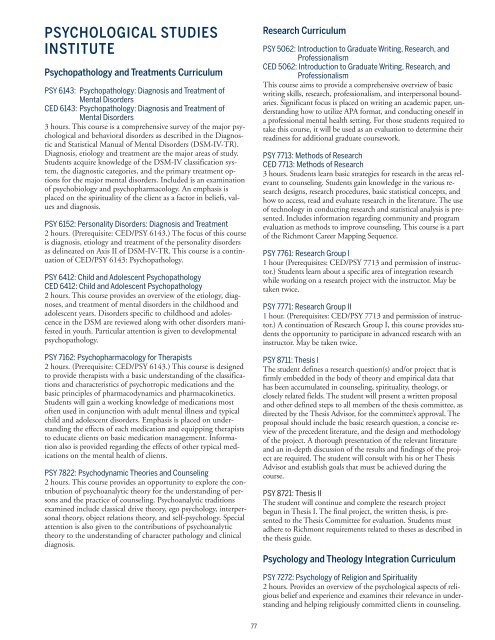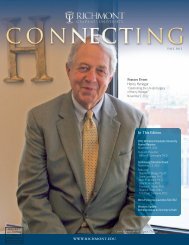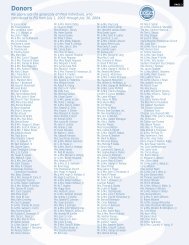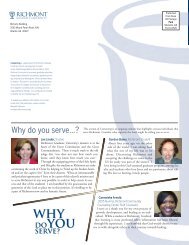Graduate Catalog 2010-2012 - Richmont Graduate University
Graduate Catalog 2010-2012 - Richmont Graduate University
Graduate Catalog 2010-2012 - Richmont Graduate University
Create successful ePaper yourself
Turn your PDF publications into a flip-book with our unique Google optimized e-Paper software.
PSYCHOLOGICAL STUDIES<br />
INSTITUTE<br />
Psychopathology and Treatments Curriculum<br />
PSY 6143: Psychopathology: Diagnosis and Treatment of<br />
Mental Disorders<br />
CED 6143: Psychopathology: Diagnosis and Treatment of<br />
Mental Disorders<br />
3 hours. This course is a comprehensive survey of the major psychological<br />
and behavioral disorders as described in the Diagnostic<br />
and Statistical Manual of Mental Disorders (DSM-IV-TR).<br />
Diagnosis, etiology and treatment are the major areas of study.<br />
Students acquire knowledge of the DSM-IV classification system,<br />
the diagnostic categories, and the primary treatment options<br />
for the major mental disorders. Included is an examination<br />
of psychobiology and psychopharmacology. An emphasis is<br />
placed on the spirituality of the client as a factor in beliefs, values<br />
and diagnosis.<br />
PSY 6152: Personality Disorders: Diagnosis and Treatment<br />
2 hours. (Prerequisite: CED/PSY 6143.) The focus of this course<br />
is diagnosis, etiology and treatment of the personality disorders<br />
as delineated on Axis II of DSM-IV-TR. This course is a continuation<br />
of CED/PSY 6143: Psychopathology.<br />
PSY 6412: Child and Adolescent Psychopathology<br />
CED 6412: Child and Adolescent Psychopathology<br />
2 hours. This course provides an overview of the etiology, diagnoses,<br />
and treatment of mental disorders in the childhood and<br />
adolescent years. Disorders specific to childhood and adolescence<br />
in the DSM are reviewed along with other disorders manifested<br />
in youth. Particular attention is given to developmental<br />
psychopathology.<br />
PSY 7162: Psychopharmacology for Therapists<br />
2 hours. (Prerequisite: CED/PSY 6143.) This course is designed<br />
to provide therapists with a basic understanding of the classifications<br />
and characteristics of psychotropic medications and the<br />
basic principles of pharmacodynamics and pharmacokinetics.<br />
Students will gain a working knowledge of medications most<br />
often used in conjunction with adult mental illness and typical<br />
child and adolescent disorders. Emphasis is placed on understanding<br />
the effects of each medication and equipping therapists<br />
to educate clients on basic medication management. Information<br />
also is provided regarding the effects of other typical medications<br />
on the mental health of clients.<br />
PSY 7822: Psychodynamic Theories and Counseling<br />
2 hours. This course provides an opportunity to explore the contribution<br />
of psychoanalytic theory for the understanding of persons<br />
and the practice of counseling. Psychoanalytic traditions<br />
examined include classical drive theory, ego psychology, interpersonal<br />
theory, object relations theory, and self-psychology. Special<br />
attention is also given to the contributions of psychoanalytic<br />
theory to the understanding of character pathology and clinical<br />
diagnosis.<br />
Research Curriculum<br />
PSY 5062: Introduction to <strong>Graduate</strong> Writing, Research, and<br />
Professionalism<br />
CED 5062: Introduction to <strong>Graduate</strong> Writing, Research, and<br />
Professionalism<br />
This course aims to provide a comprehensive overview of basic<br />
writing skills, research, professionalism, and interpersonal boundaries.<br />
Significant focus is placed on writing an academic paper, understanding<br />
how to utilize APA format, and conducting oneself in<br />
a professional mental health setting. For those students required to<br />
take this course, it will be used as an evaluation to determine their<br />
readiness for additional graduate coursework.<br />
PSY 7713: Methods of Research<br />
CED 7713: Methods of Research<br />
3 hours. Students learn basic strategies for research in the areas relevant<br />
to counseling. Students gain knowledge in the various research<br />
designs, research procedures, basic statistical concepts, and<br />
how to access, read and evaluate research in the literature. The use<br />
of technology in conducting research and statistical analysis is presented.<br />
Includes information regarding community and program<br />
evaluation as methods to improve counseling. This course is a part<br />
of the <strong>Richmont</strong> Career Mapping Sequence.<br />
PSY 7761: Research Group I<br />
1 hour (Prerequisites: CED/PSY 7713 and permission of instructor.)<br />
Students learn about a specific area of integration research<br />
while working on a research project with the instructor. May be<br />
taken twice.<br />
PSY 7771: Research Group II<br />
1 hour. (Prerequisites: CED/PSY 7713 and permission of instructor.)<br />
A continuation of Research Group I, this course provides students<br />
the opportunity to participate in advanced research with an<br />
instructor. May be taken twice.<br />
PSY 8711: Thesis I<br />
The student defines a research question(s) and/or project that is<br />
firmly embedded in the body of theory and empirical data that<br />
has been accumulated in counseling, spirituality, theology, or<br />
closely related fields. The student will present a written proposal<br />
and other defined steps to all members of the thesis committee, as<br />
directed by the Thesis Advisor, for the committee’s approval. The<br />
proposal should include the basic research question, a concise review<br />
of the precedent literature, and the design and methodology<br />
of the project. A thorough presentation of the relevant literature<br />
and an in-depth discussion of the results and findings of the project<br />
are required. The student will consult with his or her Thesis<br />
Advisor and establish goals that must be achieved during the<br />
course.<br />
PSY 8721: Thesis II<br />
The student will continue and complete the research project<br />
begun in Thesis I. The final project, the written thesis, is presented<br />
to the Thesis Committee for evaluation. Students must<br />
adhere to <strong>Richmont</strong> requirements related to theses as described in<br />
the thesis guide.<br />
Psychology and Theology Integration Curriculum<br />
PSY 7272: Psychology of Religion and Spirituality<br />
2 hours. Provides an overview of the psychological aspects of religious<br />
belief and experience and examines their relevance in understanding<br />
and helping religiously committed clients in counseling.<br />
77





